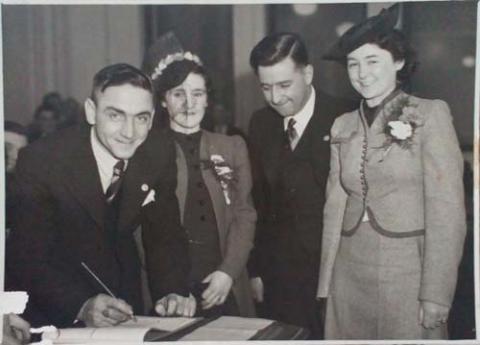International Brigade Memorial Trust
By Angela Jackson
Few people today know about Spain's civil war in the 1930s, even fewer know anything about the roles played in that war by women, and that British women were involved to a greater extent than would at first be supposed.
When starting to research the subject almost 20 years ago, I was lucky enough to get to know some of those remarkable women who had actually gone to Spain during the war, risking their lives to work close to the front lines in what was considered in those days to be a little-known and very far-away country. Now the role of women in the Spanish Civil War is to be given wider recognition thanks to a one-day event organised by the International Brigade Memorial Trust.
The Len Crome Memorial Conference will be taking place in Manchester on 12 March. Four internationally recognised historians, Paul Preston, Helen Graham, Linda Palfreeman and Sylvia Martin, will give talks that reflect the diversity of women's roles in the war, from the politics of La Pasionaria to work in the medical services.
From 1936 to 1939, Spain's Republican government was fighting a civil war that divided the country and sometimes families too. While Franco's Nationalists were receiving support from Hitler and Mussolini in the form of planes, weapons and troops, volunteers from all over the world, concerned about the rise of fascism in Europe, went to Spain to join the International Brigades and help the Republicans.
Over 50 men volunteered from the Manchester area alone. Women were able to volunteer as nurses, often serving in improvised hospitals with poor sanitation and short supplies. One such nurse was Madge Addy, from the Chorlton-cum-Hardy area of Manchester. She arrived in Spain in 1937 and became Head Nurse at a hospital in an old monastery at Uclės in Castile. Like some of the other British nurses, she was also involved with the fund-raising campaigns back home. Madge would write detailed letters about the work being done in the 'Manchester Ward' at the hospital in Uclės to the Chairman of the North Manchester Spanish Medical Aid Committee to help with the campaigns for medical supplies.
It was easier for people at home to identify with the image of a ‘nurse’, the ‘girl next door’ perhaps, or a daughter, an ordinary girl in extraordinary circumstances who was doing her best. They could feel that their donations would be well spent in such capable hands.
Madge's appeals were given national coverage by the Daily Worker, with the dramatic headline, 'Nurse gave her blood to save men of Madrid', together with a picture of her in a direct arm to arm transfusion with a wounded soldier. This rather haphazard but often effective method for saving lives was to lead to the development of new, improved techniques for the mass collection and preservation of blood by the doctors in the Republican medical services. Their work was to save countless lives in WWII.
Meanwhile, as the battles raged on, Madge wrote to say she had become 'very much attached' to a Mr Holst, who held an important position at the hospital, and that they intended to marry. 'In the meantime', she wrote, 'Spain and the hospital come first, I have pledged myself to both for a year, then I am hoping to be able to turn my thoughts seriously to some kind of happy future…'
As the war progressed, conditions worsened and shortages became more acute. One of Madge's letters explained: '…the Committee sent out a gross of Izal toilet rolls, but they cannot be used for the purpose they were intended for. The director said to me, “Madge, we were very glad indeed for the paper.” I said, “What paper?” and he said, “Well it was really toilet paper, but we are using it in the office, come and see.” And at every desk, by each typewriter is a roll of Izal toilet paper, and the clerks are typing away on it! That will give you some idea of the shortage of everything.'
Her pleas became desperate as supplies could not always get through. Hundreds of sick and wounded men were arriving from the front. The few clothes they had were infested with lice and had to be burned, and they had often been fighting in bare feet. ‘You probably wonder where the things go to,’ wrote Madge, ‘but you cannot take the shirt, pants and vests off them when they are discharged and send them away without, if you have them.’
She told them that the last group had arrived with next to nothing, and would have to be discharged ‘practically nude’ as there were no more clothes to give them. Her patients were dying from lack of food and there was only one syringe in the hospital which she ‘guarded with her life.’ Her requests were simple, ‘…please ask Manchester to do its utmost to send money so that you can buy stuff necessary. Don’t send anything for me, devote every penny to the hospital.’
Women of all classes in Britain responded to such appeals, joining the 'Aid Spain' groups that sprang up all over the country to send humanitarian help to the Republic, many of them run by women.
In the 30s, women were still marginalised in the established party political system and the union movement. As one Manchester resident, Bessie Berry, pointed out, trade union meetings were often held in public houses, and she had been ‘a bit shy about going into pubs in those days’.
In addition, attending evening meetings could be impossible for women who had children to care for, whereas they could help 'Aid Spain' groups in many different ways, such as collecting tins of milk for refugee children. Women soon took on important roles on the various committees for Spain and demonstrated that their talents and energies were valuable assets at all levels.
A Manchester woman, Winifred Horrocks, played a leading role on the Committee of the 'Manchester Foodship for Spain'. The group organised an exhibition of Picasso's Guernica in a Manchester motor showroom, entrance 6d, all proceeds to the foodship, and 'Houswife Days' to appeal for gifts of food.

Bessie and Sam Wild's wedding.
Manchester women also played a crucial role in looking after some of the nearly 4,000 Basque children who came to Britain in 1937 to escape the bombing of Bilbao. No government help with funding was given; all the work of setting up colonies, caring for the children and fund raising was done by volunteers.
After three years of civil war and with Franco's victory imminent, the International Brigades, foreign nurses included, were withdrawn from Spain.
Bessie Berry was among those who went on campaigning for Aid Spain, and it was at one such meeting that she met the former Commander of the British Battalion in the International Brigades, Sam Wild. A newspaper article featured their 'love at first sight' romance, and his proposal of marriage after only ten days.
Like many other women who had rallied to help the Republic, Bessie continued campaigning for 'causes' for the rest of her life. Madge Addy was the last British nurse to leave Spain but what happened to her after that did not come to light until recently.
She married the Norwegian she had met in Spain, Wilhelm Holst, and during the Second World War she went on to play a vital role in setting up the famous 'Garrow-Pat O’Leary' escape line, working with MI9. She was awarded the OBE for her work in France; her bravery included travelling as a Norwegian subject on German civil flights, carrying secret messages sewn into the lining of her fur coat. As an English woman operating in enemy-occupied territory, she would have known what the penalty would be if caught.
Madge Addy died in 1970 before I had the chance to interview her, but, in the course of my research, I was lucky enough to get to know some of the other women who had worked as nurses in Spain. Their fascinating experiences not only led me to write several books on the history of their work in the civil war but also inspired me to write a novel, Warm Earth, to reveal the true extent of the fortitude and passion that had filled their lives.
© Angela Jackson, whose Spanish Civil War novel, Warm Earth, is now available on Kindle from Amazon. To celebrate the IBMT Conference, it can be downloaded free from 12-16 March 2016.
Len Crome Memorial Conference: Women and the Spanish Civil War, 12 March, 11am-5pm, Manchester Conference Centre, Sackville Street, Manchester, M1 3BB. Entrance £10.
